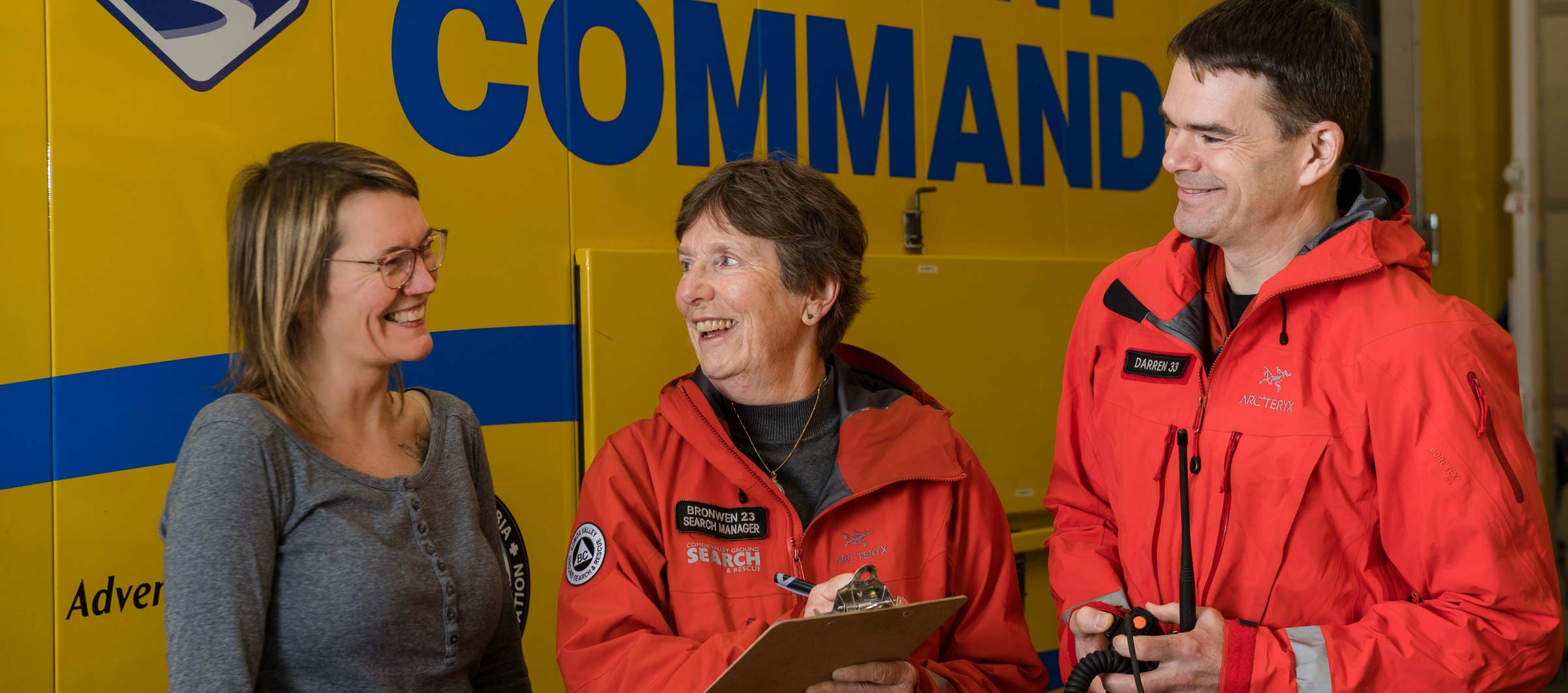
February 14, 2023
Incredible wilderness and back country adventure are two things that attract many to the BC west coast. But sometimes a weekend hike or a ski vacation can take an unexpected turn, and an idyllic nature trip that was meant to be relaxing and rejuvenating becomes daunting and dangerous. Maybe a wrong turn leads to lost bearings, or a tumble taken means someone is unable to get back to their vehicle.
That’s when the services of a group like Comox Valley Ground Search and Rescue (CVGSAR), become invaluable.
For almost 50 years CVGSAR has provided a wide range of search and rescue services, including swift water rescue, avalanche rescue, first aid, rope rescue and K9 (using trained search dogs), in an area stretching from Oyster River in the north to Cook Creek in the south and from Buttle Lake in the west to the Georgia Strait in the east, including Denman and Hornby Islands. All of these services (including 76 requests for help in 2021!) are delivered to the public at no cost.
In the past 10 years CVGSAR medical rescues have increased from 2% to 18%, says Bronwen Beedle, Treasurer and Search Manager with CVGSAR. This is one of the reasons the group is so focused on ensuring that members’ first aid skills are up to the tasks at hand. Recently a $5000 donation from First Credit Union enabled 10 members to take part in an intensive Wilderness First Aid course that trains people to administer first aid in remote locations with minimal equipment.
“Basically, we consider ourselves first responders for the back country,” Bronwen says. Back country areas are beyond the jurisdiction of local fire departments, and military search and rescue only respond on certain occasions she explains. “And we generally only call them in life and death situations.
“So, our members have to do what they can with what they have—for example, stabilizing a broken limb or making sure the person is warm and preventing hypothermia from setting in.” And that’s the type of thing the Wilderness First Aid training course prepares people for.
The public services that CVGSAR provides are critical in an area that attracts outdoor enthusiasts and people who want to enjoy better work-life balance via access to nature and wild places. In turn, having the opportunity to enjoy natural places often inspires people to be more environmentally responsible.
In addition to back country rescue operations the group’s other main focus is urban searches, particularly for lost and runaway children and seniors with dementia. CVGSAR also works with search and rescue groups in other communities to provide mutual aid and helps to educate people about being prepared when they venture out into the back country.
“We are part of the AdventureSmart program, which is highlighted on our website,” Bronwen says. AdventureSmart is a national program which encourages Canadians and visitors throughout the country to “get informed and get outdoors.” Search and rescue groups promote and educate using this platform because it is designed to teach outdoor recreationalists to be prepared, make informed decisions, and it reduces the frequency, severity and duration of search and rescue incidents.
CVGSAR runs the AdventureSmart program in schools, for community groups, and the general public.
“We talk about the importance of staying put [when you’re lost], leaving a message as to where you're going before you go, having someone know when you’re expected back. And we go into what to do when you think you're lost.”
Like most search and rescue groups across the country CVGSAR is 100% volunteer run, and these committed individuals are on call 24 hours a day, seven days a week. Being involved in a group like this allows people to use and learn important skills, Bronwen says.
“We are a mixture of men and women from all walks of life,” she explains. A love for the outdoors, a love of learning, and a desire to give back to the community and help others are things they have in common. And though the group doesn’t usually hear what happens to rescue subjects, sometimes they do, and it’s very rewarding.
“A few years ago we did a rescue and we helped a lady who was very badly hurt. She came back to us [later] and told us how what we had done helped her. We were just boggled because we didn't think she was ever going to be able to stand up, and there she was walking and talking, so that was really neat. [When we hear back from people] it’s always heartwarming.”
People wishing to learn more about CVGSAR, or donate to the group’s efforts, can do so at www.cvgsar.com. Since their current lease ends in 2023 one of the group’s current major fundraising initiatives is Roofs for Rescuers, a campaign that will enable the purchase or building of a permanent home for CVGSAR.
Written by: Emma Levez Larocque

